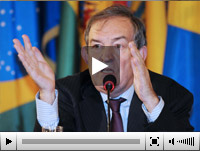- English
Cátedra de las Américas
Thirty Alejandro Miró Quesada - Jean-Louis Bruguiere
Thirty Alejandro Miró Quesada - June 22, 2009
"The Fight against Terrorism and the Promotion of Democratic Values”
Orador:
Jean-Louis Bruguiere, former Vice President, terrorism section, Paris
Court of High Claims
In the XXXVI Lecture, "The Fight against Terrorism and the Promotion of Democratic Values," Judge Bruguiere classified terrorism as a challenge to democracy and its fundamental values. He explained that the necessary response engendered by this threat will only be legitimate and effective if it remains within the scope of the rule of law and promotes democratic values. He assured us that both of these proposals should not be antithetical.
In his view, terrorist violence must not trigger responses that fall outside the rule of the law, violating basic principles of human rights and whose "extraordinary" character seems justified by the seriousness of the threat. While rulers are protectors of the safety of their citizens, they must, when confronted with terrorist violence, respond with the utmost firmness. By no means should they respond with the weapons of their opponents, regardless of the seriousness of the situation, the pressure of public opinon, and policy implications. The management of a crisis must be firm, resolute, uncompromising, but respectful of the fundamental values that underlie our institutions.
Judge Bruguiere warned against embracing a strategy that violates human rights or the rule of law, as it will be ineffective in the long run because it necessarily engenders corrections. Furthermore, it is often brutal and difficult to manage politically by the supervisory bodies of the State, including the judiciary. He reminded us that during his inaugural address, President Obama reiterated the danger posed by terrorism to the United States and the democratic order and reaffirmed the willingness and commitment of his country to "defeat those who seek to ensure and promote their goals through terror and the massacre of innocents." When President Obama took office, the first thing he did was to close Guantanamo and ban the harsh interrogation techniques used by the CIA. He justified his decision, stating: "our nation is stronger and safer when we deploy both the full extent of our strength and the power of our values, including the rule of law."
In reference to Latin America, Judge Bruguiere stated that it has not yet suffered from the actions of radical Islamic networks linked to Al Qaeda. Yet, this situation could change in the future, especially as organized crime extends its reach to terrorist organizations.
“It is not my intention to propose a model of anti terrorism. There are none that have a universal applicability. Each state must find its own way, according to its history, socio-cultural factors, its institutions, its regional environment, the geopolitical environment, and, of course, the types of terrorist threats that it faces. But the requirement for a legal approach to the fight against terrorism is a constant that must transcend the different national approaches.”
Whatever the state of the terrorist threat in the Americas, Judge Bruguiere believes that OAS Member States should develop a doctrine of effective, collaborative, and respectful core values in the fight against this threat to facilitate the necessary international cooperation and to improve control over the evolution of terrorist organizations and their criminal activities. Judge Bruguiere highlighted that Europe has recorded remarkable progress in the fight against terrorism and organized crime with the European Arrest Warrant and Joint Investigation Teams. These institutional mechanisms can serve as a point of inspiration for the Member States of the OAS The transnational dimension of the terrorist threat requires a response that can not be exclusively domestic.
After giving an overview of the genesis, evolution, and current situation of Islamist extremist terrorism and its effects around the globe, he warned that geopolitical factors, in conjunction with the Middle East, such as an aggravation of the dispute over Iran's nuclear program or new tensions in the region of Sham, could have implications for security issues in Latin America. Judge Bruguiere pointed out that although there is no evidence, we can not exclude the notion that a shared feeling of hatred against the United States is likely to facilitate objective coalitions between radical Islamic groups, criminal organizations, and even local terrorist networks operating in Latin America.
In the absence of deadly attacks, he stated that the public is unlikely to accept infringements on its freedom, even if they are limited and justified by the fight against this scourge. The paradox lies in the fact that in this context, it becomes much more difficult to obtain the resources, legal and material wise, to prevent or mitigate the risk.
Falling into the opposite extreme, is France, which rejects the notion of "war against terrorism" and has, subsequently, allowed many abuses to be perpetrated as a consequence. Terrorism amounts to an indirect strategy, asymmetrical used by non-state actors to promote an ideology or to bring a claim. In some cases, as in Afghanistan and in tribal areas of Latin America, where organizations like the FARC or the "Shining Path" have formed armed militias, the use of military force can be based, but the priority should always be intelligence, says Bruguiere.

